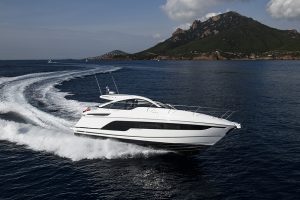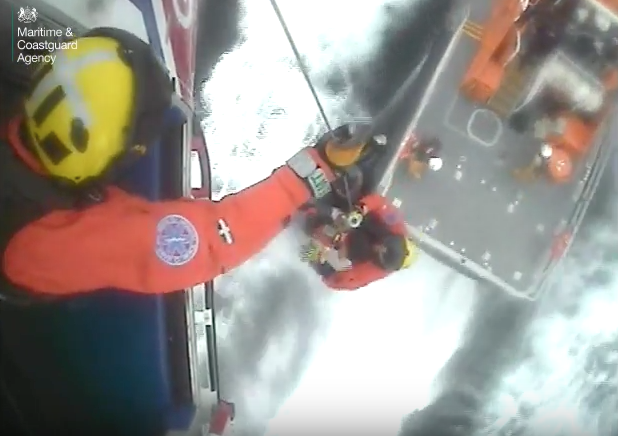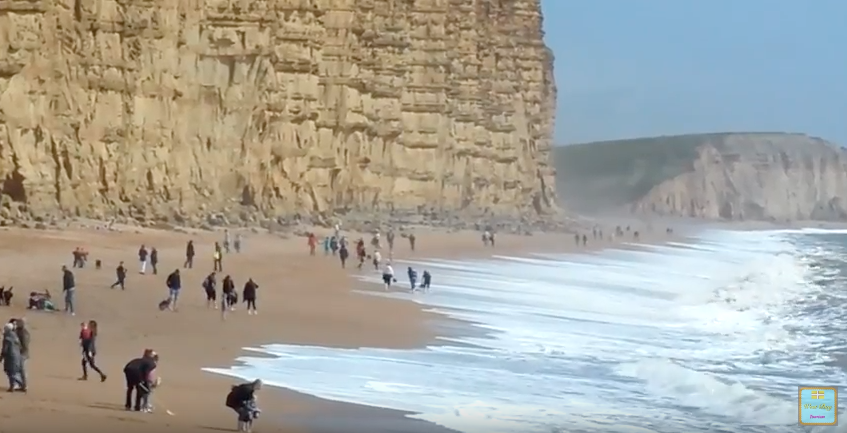UK Coastguard helicopter makes 500 mile mercy dash to rescue unwell yachtsman in the Atlantic
Watch as an unwell yachtsman is winched to safety by the crew of a UK Coastguard helicopter in heavy seas in the Atlantic
A “desperately unwell” sailor, who was trapped on a yacht in heavy seas in the Atlantic, has been airlifted to safety by the UK Coastguard.
The boat was 203-nautical miles west-south-west from the Isles of Scilly when the crew used their satellite phone to declare their Mayday to the Coastguard at 11.40am yesterday (29 June).
The skipper reported that one of his crew was unwell and needed urgent medical assistance.
The UK Coastguard search and rescue helicopter based at Newquay was then deployed to assist.
Due to the distance involved, communication with the vessel was poor and patchy, so the UK Coastguard got the yacht to activate their EPIRB to establish their exact position.
A Mayday relay broadcast was then issued asking all nearby vessels for assistance.
A military fixed wing aircraft and an Irish Casa fixed wing aircraft took turns to establish communications with the vessel so that information could be relayed back to the UK Aeronautical Rescue Co-ordination Centre (ARCC) which is based at the National Maritime Operations Centre in Fareham.
The Coastguard were able to keep in constant contact with the vessel and relay information to the helicopter crew while they were flying to the yacht.
Continued below…
Tripper boat Surprise grounded off the Isles of Scilly due to lack of passage planning
The Marine Accident Investigation Branch also found that the issuing of local boatman's licenses by the Council of the Isle…
Video: Fisherman airlifted after boat fire off Land’s End
Watch the dramatic moment a fisherman is airlifted to safety after his boat caught fire off the coast of Land's…
Cliff fall closes ‘Broadchurch’ beach in Dorset
A large cliff fall has closed a section of the Jurassic Coast in Dorset. The public are being urged to…
After leaving Newquay, the helicopter refuelled in the Isles of Scilly before continuing its journey, arriving at the yacht’s location just before 4pm.
The casualty was then winched on board the helicopter.
On its return journey, the aircraft refuelled again on the Isles of Scilly and the casualty was landed at Newquay Airport for further transfer to the Royal Cornwall Hospital in Truro by land ambulance.
Commenting on the rescue, the commander for the UK Coastguard, Mark Rodaway, said: “At this range, it was vital that the helicopter was able to rendezvous with the vessel and evacuate the unwell crewman with as little delay as possible.”
“This is a superb example of military and Irish Coastguard co-operation and we would like to thank all those who have played their part in bringing this rescue to a textbook conclusion,” he continued.
“Our priority is to protect life at sea and we will always do everything possible to provide assistance for a mariner in need. Thankfully, we have been able to get him to hospital and we hope he is on the road to recovery after his ordeal,” added Rodaway.
The helicopter’s chief pilot, Mark Coupland, said the aircraft has a range of just over 200 nautical miles, depending on wind.
He said the support of the military and the crew of the Irish Casa fixed wing aircraft helped make it a successful mission.
“They provided vital communications assistance between the vessel and our aircraft as well as maintaining a watchful eye over us at such a great distance from land,” he said.
“Just as importantly they made sure the vessel had adjusted its course to prepare for the winching which saved us valuable time on scene. Their support ensured our hover time was dramatically reduced which meant we were able to winch the crewman on board in a matter of minutes,” he explained.
“In the heavy sea state the vessel was obviously having difficulty maintaining a steady course which we required to conduct a transfer from the deck. Due to the limited time available to us we suggested they stream their dinghy with the casualty in it to allow a swift pick up while maintaining clearance from the yacht’s mast,” continued the helicopter’s chief pilot.
“When you’re operating at the limits of your range and endurance in a potentially life and death situation such as this one, every minute counts. We wish the crewman a speedy recovery,” added Coupland.











